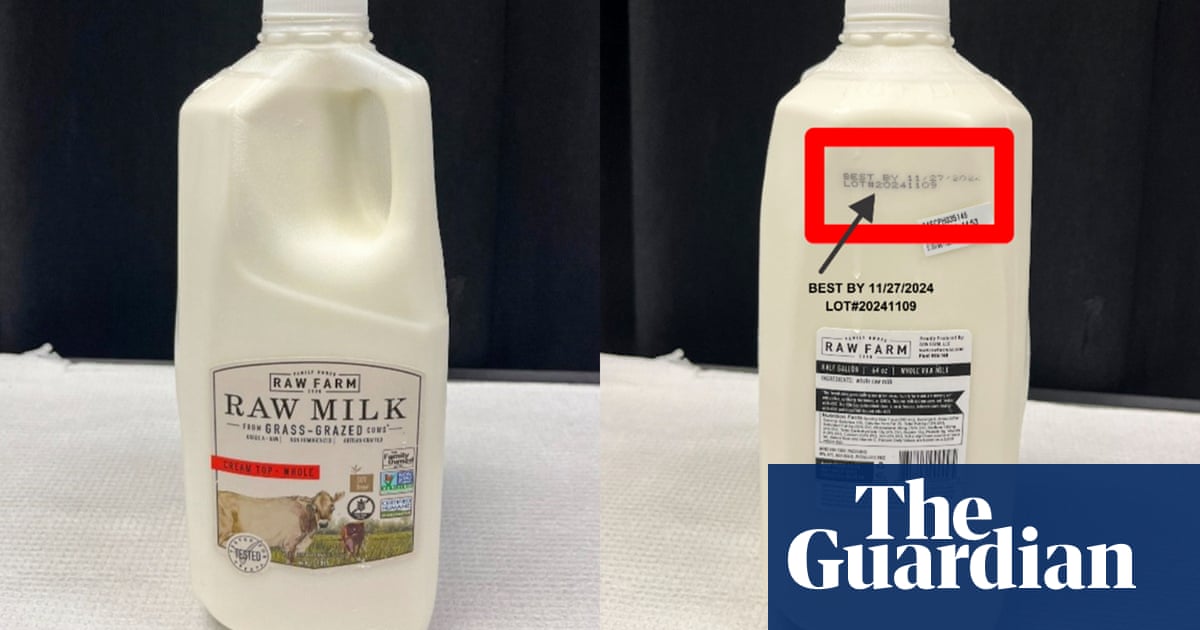No illnesses traced to batch as health officials warn consumers to avoid purchase
Archived version: https://web.archive.org/web/20241125145922/https://www.theguardian.com/us-news/2024/nov/25/california-raw-milk-bird-flu
SpinScore: https://spinscore.io/?url=https%3A%2F%2Fwww.theguardian.com%2Fus-news%2F2024%2Fnov%2F25%2Fcalifornia-raw-milk-bird-flu



In Colorado, the big agricultural/ranching areas are the most reactionary. One cattle town, Greeley, even attempted to secede from the state over the barest COVID restrictions. Raw milk is a big culture war thing for them and the hippies who flocked to the most densely populated areas of the state. Luckily we live in the 21st century though and it's illegal for a commercial dairy to sell unpasteurised milk.
So anyways the dairies are owned by reactionaries who love selling raw milk to other reactionaries. Since it's legal to drink the raw milk of your family cow, the dairies circumvent food safety laws by selling a "share" of a "cow". That entitles you to X amount of raw milk per week. The cow is one of hundreds in an industrial dairy being fed chicken shit. The first human case from this current epidemic was a prisoner being used as slave labour to bury all the chickens at an infected farm.
It's so much filthier than any of the racist shit hogs said about Chinese wet markets. This is a wholly manmade horror perfectly within our comprehension purely being driven for profit. I hope it ends with crucifixions.
is there anywhere in the western world where this isn't the case
love 2 separate town and country with no consequences
what?
Overextraction of raw materials from rural communities drives the overdevelopment of cities at the cost of underdeveloping those rural communities, further alienating them and driving them to reactionary politics. It's a self-fulfilling prophesy.
Genuinely asking, what does this mean?
It's similar to colonialism: https://www.marxists.org/archive/marx/works/1845/german-ideology/ch01c.htm
One of Marx's first big ecological ideas was observing how sheep were transforming England. The growth of textile mills in cities meant that the cities became the economic, social, and cultural hubs. That's the primary tax base and population centre so that's where the money from the factories goes and where an individual has opportunities/infrastructure. Meanwhile to feed those mills and their growth you need a larger source of raw materials. That's cotton from slave plantations and wool from English shepherds. The countryside was transformed as small farmers were displaced and nature was degraded to make more room for sheep, just as the American south became dominated by large slave plantations. The wool sells for a lower price than the shirt so they have less direct revenue coming in, the lower population density and alienation from opportunity/infrastructure both negatively impact its tax benefits, and to top it off they're poisoned by the work of extraction and the pollution of the cities they build. Cities and markets have to grow to compete with each other, and that growth sucks the life out of rural and natural systems.
So what's to be done about this?
https://www.marxists.org/archive/marx/works/subject/hist-mat/hous-qst/ch03b.htm
It's why I'm Team Degrowth and a big believer in art nouveau. We need simplified, localised, non-commodified production and consumption. Craftsmanship and home economy, alternative agriculture systems which support individual families and immediate communities, mutual aid networks, severe regulation of resource extraction and pollution, centralised state control of those industries with a focus on becoming an ecological civilisation, and funding rural communities more to encourage a more even population distribution that's still in line with the carrying capacity of the land. China has been pretty good about tackling a lot of these problems in recent years but I think a real solution is a more radical reorganisation of supply-side economics and infrastructure to make the countryside more evenly developed at a lower scale than industrial society.
edit: John Bellamy Foster's work is invaluable if these problems interest you. It centres around this idea and the underlying idea of the metabolic rift.
a reference to Marx and Engels’s assertion that the goal of communism is to eventually reconcile the division between town and country
The point I'm trying to make was that this isn't a Colorado problem, due to systems involved